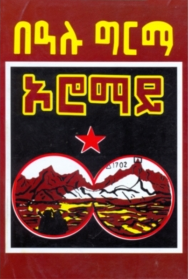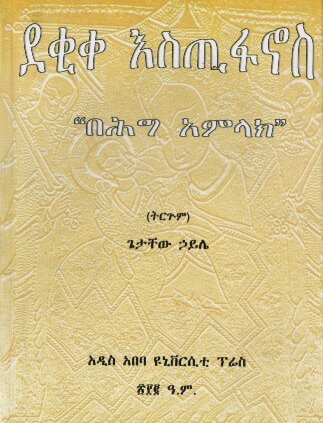Solomon Negash
Abiy Ahmed refused dialogue, opted for war, and resisted diplomatic pressure. Make no mistake. This has been his consistent position from day one. He never resolved any tension peacefully with any of his major adversaries at home, including Jawar Mohammed, Eskinder Nega, Lidetu Ayalew, Yilkal Getnet, and many more who are languishing in jail on trumped-up charges. Not even with his long-time comrade Lemma Megersa. He never tried even once to sit down with these people and resolve his political difference peacefully around the table. This says it all, Abiy Ahmed has never been a man of peace. It is not in his nature. Because, as he repeatedly declared and inscribed in his book, he dreamed of being in power for the next 10 years. Absolute power corrupts absolutely, right?
I was among those who celebrated the day he was selected as a winner of Nobel Peace Prize in 2019, even if he never did anything notable to deserve such a prize. But I saw it as an opportunity to encourage him to make peace at home, be committed to successful political transition, and to get the attention and support from the international community to help Ethiopia overcome the eminent danger of collapse it was and still is facing. But sadly, he used that opportunity to consolidate his political power at the expense of peace and stability of the country.
I said, he never did anything notable to deserve such a prize. It may sound an outrageous claim but let me clarify.
The “no peace, no war” condition that lasted for two decades was basically a reflection of the deeper conflict that existed for decades between two dominant political parties: TPLF/Tigray and PDFJ/Eritrea. While in power TPLF called for peace on several occasions, but Eritrea has never been willing to answer such calls. PDFJ sees TPLF as an eternal enemy who ruined the dream of EPLF (former PDFJ) and young Issias to become a leading power in the region. For example, the former Prime Minister Hailemariam Desalegn, made calls for peace several times, but Pr. Issaias Afewerki was not interested. He refused to negotiate with a “puppet” (his word). When Abiy came to power and signaled his interest to make peace with Eritrea (which was decided by EPRDF centrally as part of their reform agenda before Abiy came to power), Pr. Issaias did not show any interest and never answered for several weeks. Only when he noticed that Abiy entered a new chapter in his power dynamics that Afewerki showed interest. It was when he knew Abiy was determined to get rid of TPLF leaders from Menelik palace, and when he witnessed the key leaders of TPLF left Addis Ababa for Mekelle, that Afewerki reconsidered and answered for the call. In a way, he was the main player for the two nations to coming to the so-called “peace”, which was later prized by many.
For those who knew the history between these two rivals, there was no genuine peace to celebrate. There was and still is a tactical alliance between two groups who have a common enemy, called TPLF. As Kjetil Tronvoll, a leading expert on Ethiopia and the Horn of Africa, once accurately described it, “the ultimate goal of Isaias Afewerki is to crush TPLF and to inflict revenge upon Tigray”, not peace. Thus, what seems progress in peace is actually and paradoxically a broadened conflict which sucks in several new actors into play. The two actors that were in conflict are still in conflict, but this time joined and backed by several other actors (such as, Prosperity Party and the ethnic based militias from the Amhara region) which sided with PDFJ.
It is the alliance of these groups that declared war today not only against TPLF, but also against the people of Tigray. What started by marginalizing and discriminating ethnic Tigrians, for example, banning from national sports, cutting budgets, preventing humanitarian aid from entering Tigray, and refusing to send medical appliances related to COVID19, is now upscaled to a full-fledged war that involves aerial bombardment including in densely populated towns. (And yes, Ahmed declared and warned about this live on national television.) As such, Abiy Ahmed begins to commence on a new road, from Nobel Peace center in Oslo to ICC in The Hague, in just one year.
The decision to grant an organisation the Nobel peace prize might be seen in some quarters as a retreat from controversy by the Nobel committee. Last year the award was given to Abiy Ahmed, the prime minister of Ethiopia, for making peace with Eritrea and seeming to open up space for democratic dissent. But a year later Ethiopia remains deeply troubled and Mr Abiy is not as popular as he was. Bestowing the prize on the WFP, which is less likely to disappoint than any political leader, is a safe option.
The Economist | International | Oct 9th 2020. A Nobel cause.
Excerpts from Famine and Foreigners – Peter Gill – PP167-170
In my first interview with Meles Zenawi, we covered the government’s protracted arguments with the aid-givers over the free market reforms that they expected Ethiopia to adopt and which Ethiopia on the whole resisted. This was the first of the ‘aid conditionalities’. Seven weeks later I was back in the surreal quiet of the prime minister’s secretariat. This time we started on ‘governance’—the second ‘conditionality’—which Meles regarded as another unwelcome neoliberal imposition. ‘We believe that democracy, good governance and transparency and fighting corruption are good objectives for every country, particularly for developing countries,’ he began. Read more
By MIKE DASH
Many countries have folk-tales that feature foolish kings – monarchs whose vanity causes them to make catastrophic misjudgements or attempt impossible things. Greek mythology offers the tradition of King Midas, who lived to regret wishing for the power to turn everything he touched into gold; for we Brits, the foolish ruler is King Canute, who – at least in the common modern telling of the tale – allowed courtiers to flatter him that even the seas would obey his commands, and consequently got his feet wet in a failed attempt to turn back the tides.[1]
Most of these legends are hundreds of years old, of course, but the motif is a potent one and it still crops up from time to time. Here, for example, is a story that has stuck firmly in my mind ever since I first read it in The Book of Lists, a best-selling compendium of all sorts of remarkable trivia, first published in 1977:
The Abyssinian electric chair
On August 6, 1890, the first electric chair in history was put into use in the death chamber of Auburn Prison in New York. In distant Abyssinia – now called Ethiopia – Emperor Menelik II (1844-1913) heard about it and decided that this new method of execution should become part of his modernisation plan for his country. Immediately, he put in an order for three electric chairs from the American manufacturer. When the chairs arrived and were unpacked, the emperor was mortified to learn that they wouldn’t work – Abyssinia had no electricity. Determined that his investment would not be completely wasted, Emperor Menelik adopted one of the electric chairs for his imperial throne.
David Wallechinsky et al, The Book of Lists (London: Corgi, 1977) p.463.


